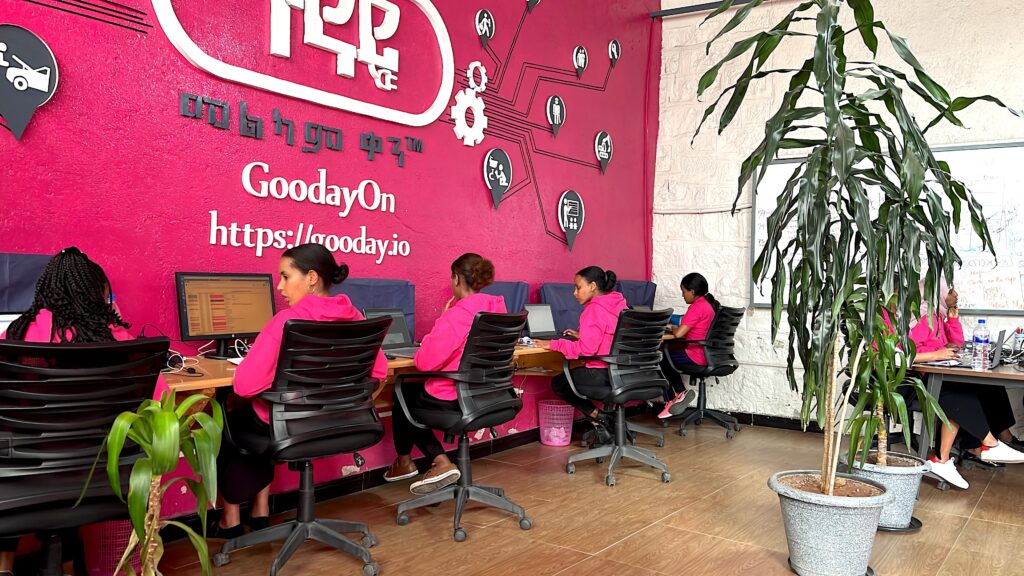By Janet Wandia & Wairimu Gitahi

The name of the Ethiopian startup GoodayOn is a play on words. In Amharic, GoodayOn (ጉዳይ) translates to ‘errand’ and can also be interpreted in English as ‘a good day.’ Alem Abreha, the founder of GoodayOn, says, “After using our service, you will have a good day because we have taken care of all your errands and chaos.”
GoodayOn is a gig platform located in Ethiopia that intermediates manual work services, largely domestic help and home repairs. Additionally, the platform offers on-demand temporary placement to small businesses for roles like office and sales assistants, cleaners, and waiters.
It matches gig workers with customers on an ad-hoc basis through an app and call center. Even though the app has over 150,000 downloads, 80% of the platform traffic comes through the call center. Alem says this is because Ethiopians are not regular mobile app users: “Ethiopians still like to pick up the phone and communicate directly, so they prefer to call us and explain what they need. Call centers are very expensive to maintain, but for now, this is the best way to communicate with the supply and demand side of our business.” The platform is experiencing high demand for women domestic workers, and those currently enrolled are overbooked.
The platform has been remarkably successful in matching women workers: 35% of the workforce on the GoodayOn platform are women looking for domestic gigs. Various barriers, including gender norms and the high cost of training and onboarding, typically hinder women from benefiting from jobtech opportunities to grow and manage their livelihoods. However, Goodayon is implementing specific strategies to recruit women. “Employers tend to dictate the terms of engagement with the workers, particularly women, who are the ones involved in domestic gigs. On the other hand, women often lack the bargaining skills to negotiate favorable terms. To be honest, the relationship between the two can be like a near-slavery arrangement. To avoid this, we intervene once a client is matched with a worker to ensure agreed-upon terms of engagement meet our standards,” says Alem. Fortunately, the team’s tech back-end enables them to track a matching within 10-15 minutes after it occurs, so they can swiftly access details regarding the terms of engagement.
This platform emerged from Alem’s personal frustration trying to secure help when he would visit Ethiopia from the US. When trying to find someone for various manual tasks around his house, such as cleaning, he often had to navigate a lengthy process of reaching out to friends and their connections. Alem explains, “I would need to call a friend, who would call another friend. It would be a long chain of phone calls before I got some help.” To streamline this process, he created an Excel sheet to organize contacts, and as the list grew, friends began requesting access and contributing additional options. The inspiration to transform this Excel sheet into a business was born not just from a monetary perspective but also from a desire to enhance the livelihoods of blue-collar gig workers.
The urban youth unemployment rate in Ethiopia was 18.7% as of 2022, with female youth unemployment at 26%. GoodayOn plays a crucial role in addressing this significant job shortage in the country by providing gig workers price standardization and end-to-end support, providing a reliable and fair framework. Meanwhile, for customers, the platform offers skills and experience verification of the gig worker, ensuring a level of quality and expertise in the services provided. Alem says the scarcity of jobs has forced many youths to resort to sitting on the streets, either relying on placing posters to advertise their services or simply waiting for middlemen (delala – traditional job brokers) to connect them to jobs for a fee.
GoodayOn has made remarkable progress since its inception only three years ago. The platform has successfully onboarded more than 30,000 gig workers, including 10,000 women, 80% of whom are active.
Most recently, GoodayOn has extended its inclusivity strategy to include people living with visual impairments. “We realized there were many blind college graduates who were contacting us to ask if we had any opportunities for them, so we came up with a strategy to integrate them into our business model as street marketers,” says Alem.
At Jobtech Alliance, we are interested in working with GoodayOn due to its potential for scalable growth and the prospect of increasing work opportunities for blue-collar gig workers. We are especially impressed to note that GoodayOn is an inclusive platform on two fronts—gender and people living with visual impairment. “There is a high demand for women domestic workers on the platform, and we aim to support GoodayOn with technical support to boost these numbers. Additionally, we seek to enhance their matching process and overall user acquisition model, including their B2B customers,” says Janet Wandia, Venture Builder at Jobtech Alliance.
At the moment, Goodayon only provides service within Ethiopia, with hopes of expanding to other regions in the continent, potentially beginning with neighboring East African countries.
___________________________________________________________________________________________________________________
The Jobtech Alliance is an ecosystem-building initiative around inclusive jobtech in Africa launched in late 2021. We’re interested in digital platforms which connect people to work opportunities that build livelihoods – this includes gigmatching platforms, job matching, e-commerce marketplaces, and more. The Jobtech Alliance helps jobtech platforms to grow and create more jobs.

0 Comments